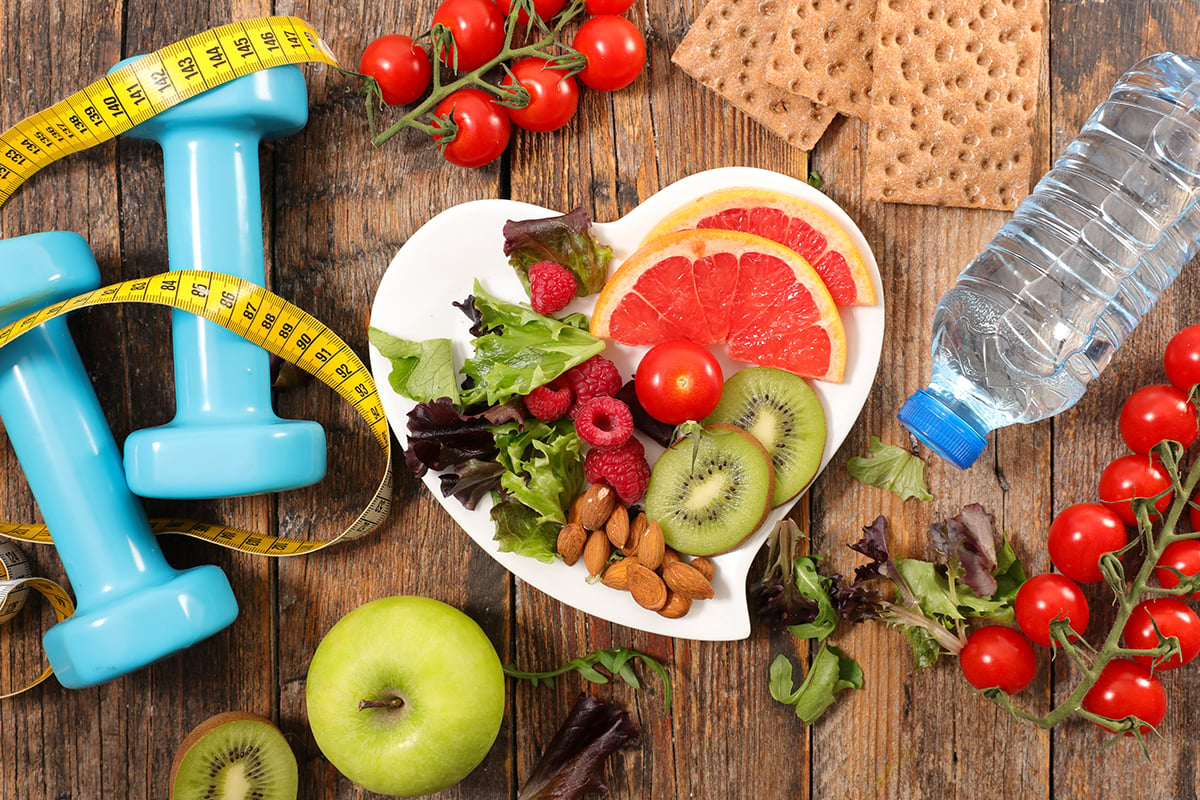An apple a day - cancer risk factors and lifestyle choices
2 February 2024 | By: Newcastle University | 3 min read
An apple a day might keep the doctor away, but a diet rich in wholegrains, vegetables, fruit, and beans could dramatically reduce all cancers.
A new study led by Newcastle University suggests that approximately two out of five cases might be preventable if people adhere to adopting a healthier lifestyle, following the World Cancer Research Fund/American Institute for Cancer Research Cancer Prevention Recommendations. Read on to find out more about the research behind reducing cancer risk factors.
Contents:
-
WCRF/AICR Cancer Prevention Recommendations
-
Adherence to the recommendations
-
Scoring system
-
Findings
-
Conclusion: reducing the risk
WCRF/AICR Cancer Prevention Recommendations
According to Dr Fiona Malcomson, Lecturer in Human Nutrition at Newcastle University’s Human Nutrition and Exercise Research Centre, “In the UK, there are more than 375,000 new cancer cases every year, and it is estimated that four in 10 cases may be preventable, for example, by adopting a healthier lifestyle”.
The basis of this study is a 2018 report on ‘Diet, Nutrition, Physical Activity and Cancer’ by the World Cancer Research Fund (WCRF)/American Institute for Cancer Research (AICR), which published lifestyle-based recommendations to reduce the risk of cancer following an analysis of the research to date by an independent panel of experts. It concluded that a combination of lifestyle choices can make a huge impact on someone’s likelihood of developing cancer and other non-communicable diseases over their lifetime.
In the 2018 report, the recommendations (first published in 2007) were updated, removing advice such as ‘eat less salt’ and adding ‘limit consumption of sugar-sweetened drinks’ to reflect the latest research. The current Cancer Prevention Recommendations are as follows:
- be a healthy weight
- be physically active
- eat a better diet (rich in wholegrains, vegetables, fruit, and beans)
- limit ‘fast foods’
- limit red and processed meat
- cut down on sugary drinks
- limit alcohol consumption
- do not use supplements for cancer prevention
- breastfeed your baby (if you can)
As well as the primary recommendations, the WCRF/AICR acknowledge that smoking and excess exposure to the sun are also cancer risk factors[1].
Adherence to the recommendations
A question remains about how much – or how little – adherence to these recommendations would impact cancer risk factors in adults.
Published in BMC Medicine in November 2023, a new study by Newcastle University experts investigated the relationship between adherence to the 2018 WCRF/AICR Cancer Prevention Recommendations and cancer risk. They measured how well individuals followed these recommendations by applying a standardised scoring system, known as the ‘2018 WCRF/AICR Score’. The score took into consideration full, partial, or no adherence. Though similar studies have been conducted in the USA, Sweden, and Spain, the purpose of this study was to investigate—for the first time in the UK—associations between the score and incidence of multiple cancers.
UK Biobank data for 94,778 British adults (average age of 56) was used in this study, which assessed the risk of all invasive cancers as well as of 14 specific cancers for which there is a strong link with lifestyle choices: prostate, breast, colorectal, lung, uterine, kidney, bladder, ovarian, pancreatic, head and neck, oesophageal, stomach, liver, and gallbladder. Although the BMI and waist circumference measurements were taken by trained research staff, the rest of the data was self-reported by the participants.

Newcastle University Food Nutrition and Dietetics students working in a lab. Photo credit: John Donoghue.
Scoring system
Adherence was assessed according to seven of the eight components set out by the 2018 WCRF/AICR Cancer Prevention Recommendations: body weight, physical activity, healthy diet (wholegrains, vegetables, fruit, and beans), fast foods, red processed meat, sugar-sweetened drinks, and alcohol consumption. The eighth – breastfeeding – was not utilised due to the lack of data.
Participants were scored on a range of 0 to 7 points, with 0 points representing not adhering to any of the recommendations, and 7 points to fully adhering to them all. For each component of the score, 0 points were assigned for non-adherence, 0.5 points for partial adherence, and 1 point for full adherence.
If the BMI and waist circumference were within a ‘healthy weight’ range and fruits and vegetables within ‘wholegrains, vegetables, fruits and beans’, 0.25 points were given for partial adherence, and 0.5 for full adherence.
Findings
In comparison with those who had the lowest adherence scores of 3.5 points or fewer, those with a score of 4.5 points or above had a 16% lower risk of all cancers combined. The average total adherence score for the participants was 3.8 points.
Each 1-point increase in adherence score was linked to:
- 10% lower risk of breast cancer
- 10% lower risk of colorectal cancer
- 18% lower risk of kidney cancer
- 16% lower risk of oesophageal cancer
- 22% lower risk of liver cancer
- 24% lower risk of ovarian cancer
- 30% lower risk of gallbladder cancer
To our knowledge, this is the first time that lower risks of kidney, oesophageal, ovarian, liver, and gallbladder cancers have been reported with greater adherence to the 2018 WCRF/AICR Cancer Prevention Recommendations.
Conclusion: reducing the risk
“Our study suggests that following the 2018 WCRF/AICR lifestyle-based Cancer Prevention Recommendations is associated with lowering our risk of cancer,” states Dr Fiona Malcomson, “in particular two of the top four cancers in the UK: breast and bowel cancer.”
The study not only supports compliance to the 2018 Cancer Prevention Recommendations to reduce the risk of cancer, but provides evidence for positive effects on a wider range of less-studied cancers such as gallbladder cancer. Greater adherence to the 2018 WCRF/AICR Cancer Prevention Recommendations was associated with a significantly reduced risk of all cancers combined. Further research is needed to better understand which specific recommendations may be driving the drop in cancer risk.
The study also acknowledged other factors that need to be taken into consideration, such as the accuracy of self-assessment, and how different regional data can affect the outcome. For example, in a similar study, the Swedish Mammograph Cohort and Cohort of Swedish Men reported a 3% reduction in cancer risk per 1-point increment in the score – considerably less than the 7% reduction observed in the UK study – as well as a 12% lower cancer risk in participants in the highest score category (less than 4 points) compared with those in the lowest category (0–2 points)[3].
Regardless, these findings are a huge step forward in understanding how much our daily lifestyle choices can affect our health in the long term.
You might also like:
- read the paper: Adherence to the 2018 World Cancer Research Fund (WCRF)/American Institute for Cancer Research (AICR) Cancer Prevention Recommendations and risk of 14 lifestyle-related cancers in the UK Biobank prospective cohort study
- find out more about Dr Fiona Malcomson, Lecturer in Human Nutrition at Newcastle University’s Human Nutrition and Exercise Research Centre
- read the original press release
References
[1] https://www.wcrf.org/diet-activity-and-cancer/cancer-prevention-recommendations/
[2] Malcomson, F.C., Parra-Soto, S., Ho, F.K. et al. Adherence to the 2018 World Cancer Research Fund (WCRF)/American Institute for Cancer Research (AICR) Cancer Prevention Recommendations and risk of 14 lifestyle-related cancers in the UK Biobank prospective cohort study. BMC Med 21, 407 (2023). https://doi.org/10.1186/s12916-023-03107-y
[3] Kaluza J, Harris HR, Hakansson N, Wolk A. Adherence to the WCRF/AICR 2018 recommendations for cancer prevention and risk of cancer: prospective cohort studies of men and women. Br J Cancer. 2020;122(10):1562–70.
